Artist’s Studios Available in Downtown Albuquerque
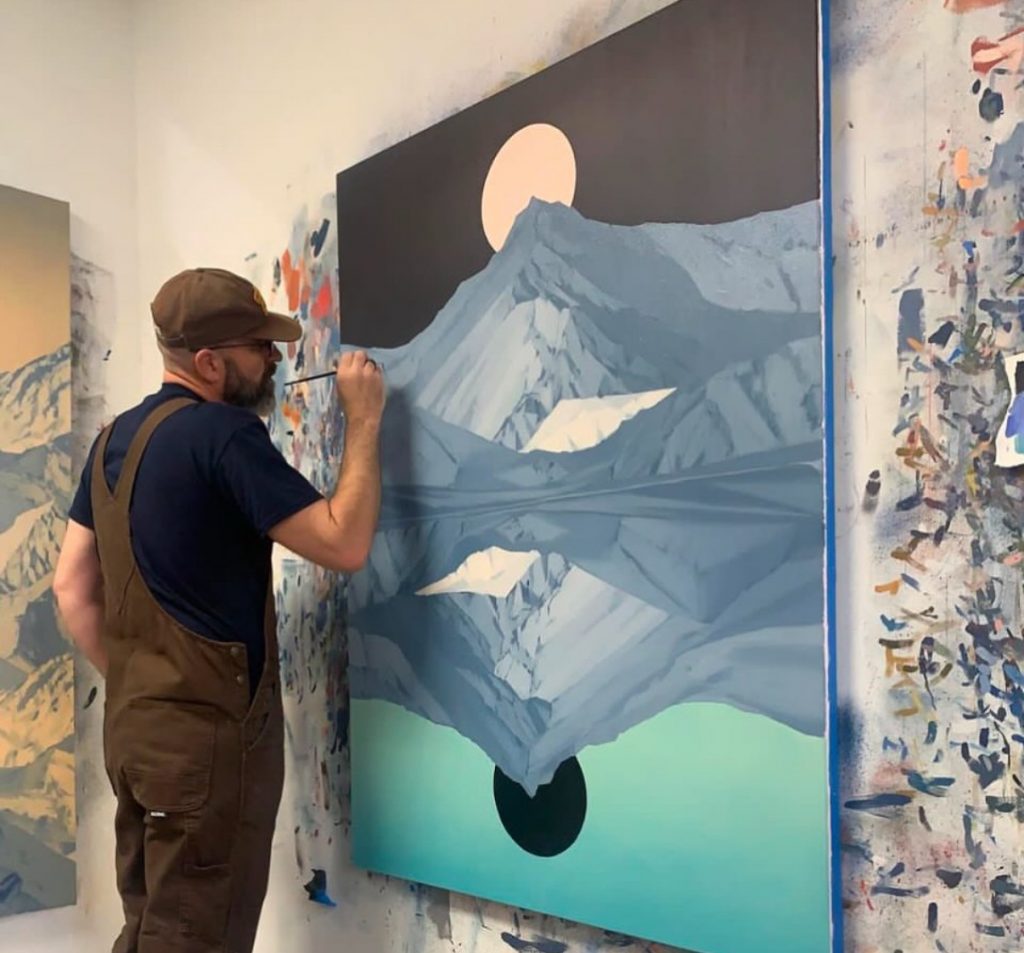
As part of our exciting relocation to the historic former GIZMO building, we are able to offer a limited number of artist studios for rent, with 400 sq ft and 800 sq ft spaces available starting this fall. This is a rare opportunity to work in a vibrant creative hub surrounded by fellow artists and makers in one of the city’s most iconic buildings in the heart of downtown Albuquerque.
Only a few studios left! Secure your space and be part of the next chapter of Sanitary Tortilla Factory.
For inquiries and to learn more, email: stfsubmissions@gmail.com.
Photo: Beau Carey, 2024
Mobile Abolition Library
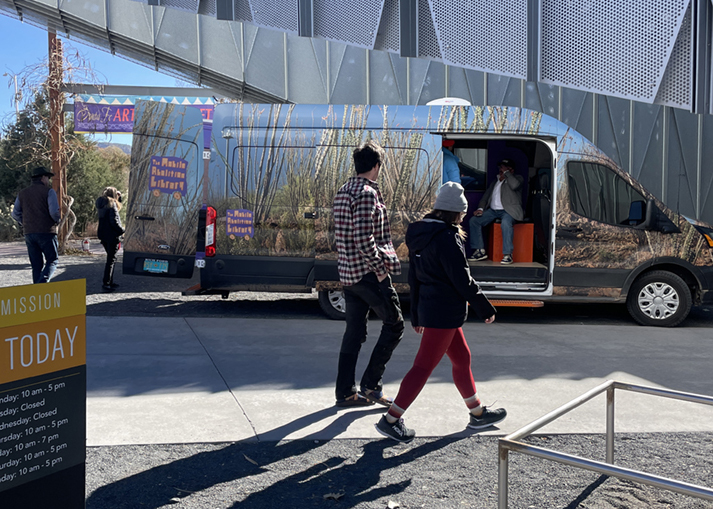
Upcoming dates:
Saturday, Feb 22, 2025 | 12:00 pm | Collaborative Filmmaking Workshop with Basement Films
Basement Films is collaborating with The Mobile Abolition Library and Marcella Ernest to offer a hands-on filmmaking workshop focused on community-based abolitionist futures art through predeveloped 16mm film, and sound at Working Classroom. This workshop is designed for POC, Black and Indigenous individuals from New Mexico, queer-identifying and non-gender conforming relatives, and allies, creating a space for collective creativity and expression. Participants will come together to produce visual art that reflects Queer Indigenous feminism, celebrating kinship, relationality, and inclusivity. The workshop offers an opportunity to engage in visual sovereignty, resist gender and sexual discrimination, and build community through collaborative art-making.
REGISTER HERE: https://forms.gle/3EA3HdcdE1ocZv7p8
Working Classroom
423 Atlantic Ave SW
Albuquerque, NM 87102
Thursday, Mar 29, 2025 | Community Day at the University of Arizona Museum of Art
Community Day in conduction with Hank Willis Thomas exhibition LOVERULES. The exhibition highlights several important series, including Branded and Unbranded: Reflections in Black by Corporate America. In Branded, Thomas explores and re-contextualizes the history of brand advertising and sponsorship through the iconography of sport. In Unbranded, Thomas digitally removes advertising punchlines and logos, with both series thereby highlighting the consistently dehumanizing strategies of corporate media, the commodification of African-American identity, and how dominant cultural tropes shape notions of race and race relations.
University of Arizona Museum of Art
1031 North Olive Road
Tucson, AZ 85719
Bad Moon Photos
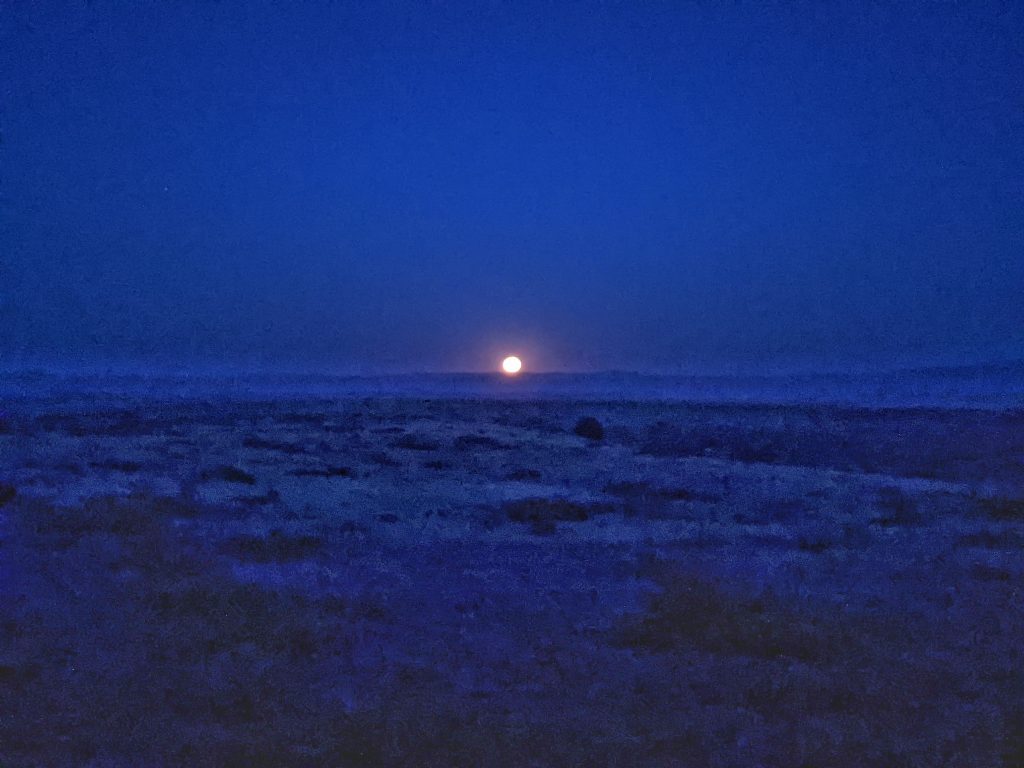
Bad Moon Photos
Ariel C. Wilson
Exhibition: November 1 – December 27, 2024
Opening Reception: Friday, November 1, 5-8pm
Sanitary Tortilla Factory is pleased to present Bad Moon Photos, a large-scale photographic installation and participatory project by Ariel C. Wilson. It is nearly impossible to take a good photograph of the moon with a cell-phone camera, but that doesn’t stop us from trying. In the summer of 2021, Wilson began soliciting bad cell-phone photos of the moon from friends, colleagues, family, lovers, and strangers. Since then, over 1,000 low-res images have been submitted to the live and growing collection. Bad Moon Photos has become an archive of collective failure, desire, and resistance. Together, the images celebrate the actions of many over the work of the solitary artist, disregarding boundaries between professionals and amateurs. These images reflect a shared impulse to use our cameras to preserve vast objects of our love and longing—the moon included. Photographs inherently compress, reduce, and
abstract their subjects. The moon resists capture, often appearing as an oblong spot in the field of black, or a tiny spec in an expansive blue sky. Despite our predictable failure, we can’t help but keep trying.
This exhibition highlights a selection of images and videos from the archive, focusing on submissions from New Mexico residents and neighboring communities. Wilson prints each image or sequence of images like family snapshots and displays them in a loose constellation on the wall. Some are printed as large-format adhesive vinyl photographs and adhered directly to the wall, becoming a backdrop for others images while exaggerating their low resolution. Short videos play on an iPhone, recording the phone camera’s inability to focus or make a proper exposure for the moon. Visitors are invited to use a small printer in the space to contribute their own images to the archive and the walls of the gallery, completing the exhibition through their own participation.
Artist Bio
Ariel C. Wilson’s work across media addresses the limitations and physical substances of photography. Instead of looking through the frame of the photograph, she uses photographic processes and materials to visualize the medium itself. She has exhibited work nationally and internationally including at the University of New Mexico Art Museum, 516 Arts, Colorado Photographic Arts Center, the Hallie Ford Museum of Art, the Pollock Gallery, Image Ark Nepal, and in the Pingyao International Photography Festival. She was included as an emerging artist on Silver Eye’s 2023 Silver List and has received a Joan C. Edwards Distinguished Visiting Professor of the Arts award, a Beaumont Newhall Fellowship; and residencies from the Utah Museum of Contemporary Art (2025), Vermont Studio Center and Bikalpa Art Center (Kathmandu, Nepal). She holds an MFA in Studio Art from the University of New Mexico and a BA in Studio Arts from Willamette University. Ariel is currently based in Salt Lake City, Utah, and is a Visiting Assistant Professor of Art at Weber State University.
Signs of Life

Signs of Life
Karl Orozco
Exhibition: September 20-October 25, 2024
Opening Reception: Friday, October 4, 5-8pm
Artist Talk: Friday, October 25th, 6-7pm
Sanitary Tortilla Factory is pleased to present Signs of Life, a video installation by Karl Orozco. The installation considers the life cycles of the urban landscape through a study of abandoned roadside signs. Since moving to Albuquerque in the summer of 2020, Orozco has photographed, mapped, and archived over 100 out-of-use signs across the state of New Mexico. He recreates these signs using the 3D modeling and animation software Blender as an attempt to crystallize these monuments in the condition they were originally seen. Each sign is animated to exist in a perpetual state between death and rebirth, and together, their collective symbolism conjures visions of the afterlife.
Orozco’s two-channel video projection alternates between dozens of signs composed in a landscape view and paired, close and intimate views of alike signs. Inspired by the rebirth process as described in The Tibetan Book of the Dead, Orozco’s slow, meditative animations ask the viewer to consider the pattern and repetition present in the manufactured world. The animations are accompanied by a synth soundtrack produced in collaboration with musician and electrician Drew Miller. This installation includes a series of benches playing with the form and scale of signage that ask viewers to consider the relationship of creator and creation between human and manmade, functional objects. This project is supported by the Fulcrum Fund, a grant program of 516 ARTS made possible by The Andy Warhol Foundation for the Visual Arts and the Meow Wolf Foundation.
Artist Bio
Karl Orozco repurposes broken and abandoned communication tools such as printers and road signs and inventively reutilizes these objects to create vibrant prints, dynamic animations, and immersive installations. Central to Orozco’s work is an exploration of these devices when they fall silent, no longer able to convey a message, and breathes new life into objects that have outlived their intended purpose. Each video or print is a record of the life cycles of these machines, offering viewers a glimpse into the intricate interplay between obsolescence and renewal. His work revolves around the concepts of death and rebirth. By granting new utilities to objects beyond their intended functionality, Orozco explores the potential inherent in the discarded elements of our manufactured landscape.

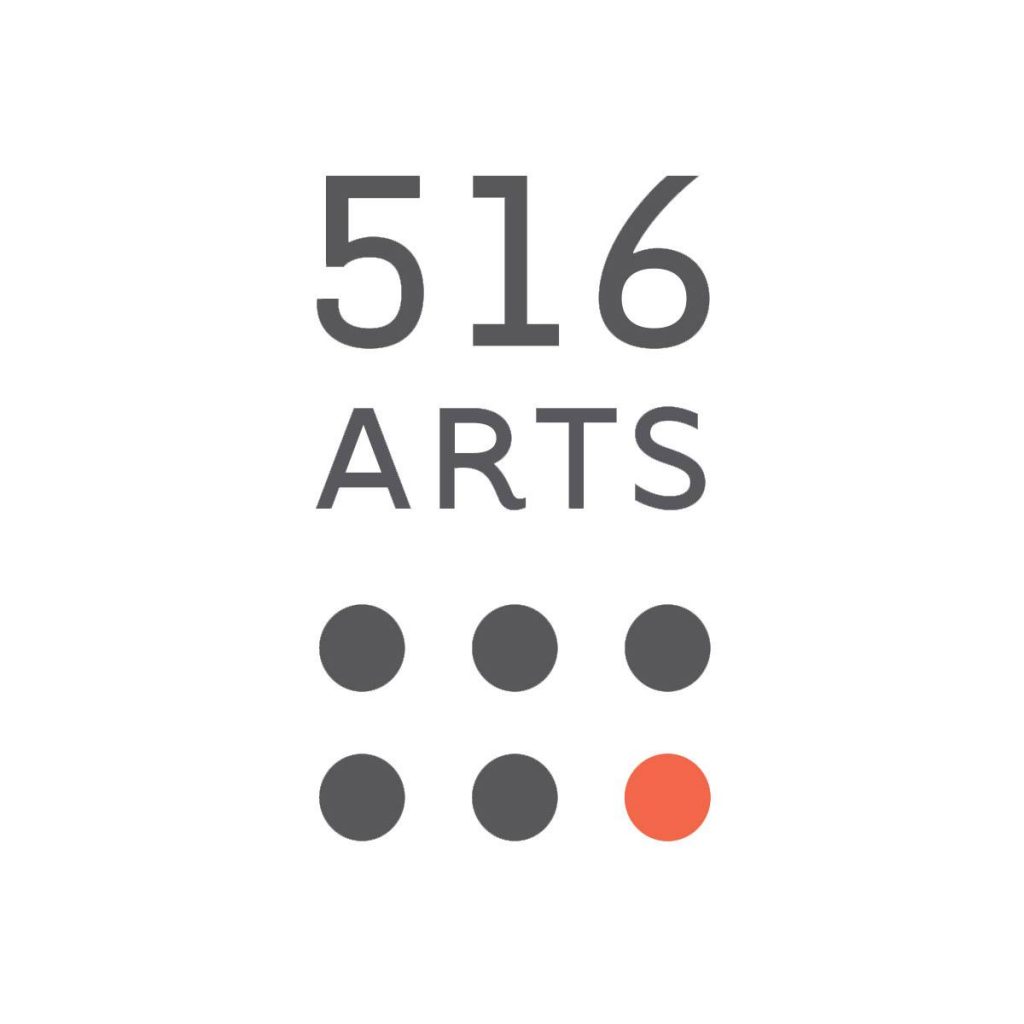
Material Connection
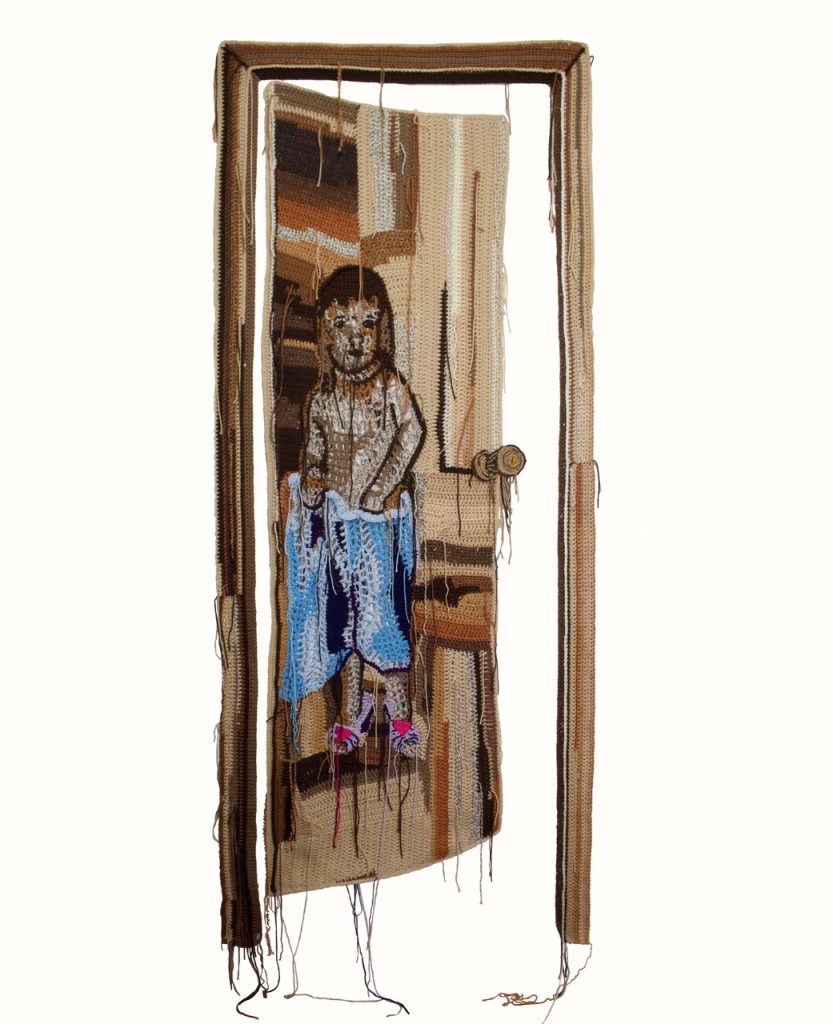
Baylee Schmitt, Door 1, Crochet Tapestry Yarn, 2024
Material Connection
Audrey An, Twiggy Boden, Baylee Schmitt, Christopher Williams, Emily Wright
August 2 – September 13, 2024
Opening Reception: Friday August 2, 5-8pm
Sanitary Tortilla Factory is pleased to present Material Connection, a group exhibition curated by Emily Wright. Material Connection brings together emerging artists from across the country who use a variety of mediums to weave connections between materials and icons, telling personal stories. Using accessible materials such as clay, yarn, and paper, they find a balance between the easily recognizable and the unfamiliar. From Audrey An’s careful perfectionism to the quick and intuitive building style of Christopher Williams, the character of their stories is reflected in their handling of materials.
As these artists re-write their own stories and examine the narratives told about them through
their material handling and storytelling, they invite us to fill in the spaces they leave open. Any story is open to interpretation, and through the use of icons, they allow us to insert ourselves into the narrative. Baylee Schmidt’s use of tapestry with modern materials riffs off the historical monumental tapestries of the medieval era, repurposing these references to speak to Schmidt’s own childhood memories. Utilizing a lexicon of childhood icons and an intense exploration of materiality, these artists craft accessible narratives that delve into the intricate nuances of their lived experiences.
Curator Bio:
Emily Wright, artist and curator, intricately weaves narratives of self and society through her terracotta vessels and fabric sculptures. With an innate curiosity about the world, she seeks to uncover unexpected connections within familiar symbols. Having earned her BFA from Alfred University in 2017, Emily cultivated her artistry while working as a potter on the east coast. Her dedication and innovation were recognized with accolades such as the Best Hand Built Piece in the 28th Annual Strictly Functional Pottery National and the prestigious Maryland Arts Council Fellowship. In 2023, she attained her MFA from Penn State University, where she was honored with the Creative Achievement Award for her boundary-pushing work. After relocating to the southwest Emily was recognized with the Surface Emerging Artist Award, and has begun showing and curating in Albuquerque NM. Her commitment to storytelling and community engagement manifests in her latest ventures, curating and facilitating the creation of large scale social justice projects. Emily’s acts as an advocate for the use of hand-work to process complex identity work.
Artist Bios:
Audrey An’s creative research revolves around the notion of applying digital technologies to ceramics from the perspective of ‘convergence’, be it cultural, technological, or interdisciplinary. She explores her own history as a “third culture kid” bouncing between Korea and the USA using the metaphor of the mixing of handwork and digitalwork to create a third kind of art.
Twiggy Boden is a queer interdisciplinary ceramic artist. Raised in the heart of the Midwest and its conservative systems, Twiggy understands feeling lost and unseen. Their art questions gender constructs and performance through sculpture and wearable art, allowing young queer people to defy the constructs that raised them.
Baylee Schmitt’s work creates a liminal space, existing somewhere between the psychological and the real, and at the juncture of self and environment. They revere the small labors and toil of the medium; a sacred practice rooted in commitment and devotion. Each stitch passes through their fingers, creating an environment saturated with touch. Bringing form to things that no longer exist as they once did is key to Schmitt’s artistic practice. Her current body of work is a crocheted replica of the kitchen from her childhood home.
Christopher William’s has spent time studying traditional fresco painting and garden architecture in Florence, Italy. They are a story-teller through the twisting of tradition and history and making hand built ceramic vessels giving a voice to objects through theatrical and performative installation. Interested in translation and transformation of objects and personal identity, the pieces are exhibited in various stages of alteration and growth. Hand-drawn animation is often projected over the displays to activate and decorate the installation when the performer is absent.
Emily Wright’s practice explores identity and community through personal narrative. She employs clay and fabric as her creative instruments. Her art deftly melds traditional pottery and quilt-making techniques with unexpected materials to achieve a harmonious balance between time-honored craftsmanship and moments of creative revelation.
